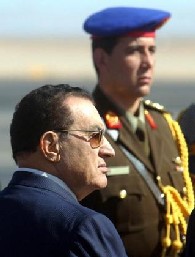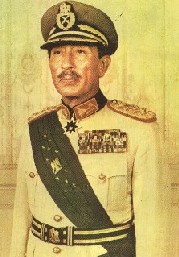|
Like his neo-con colleagues, Bush
believes democratic systems, which promote a free market
economy, go towards neutralizing the swamps of
oppression, frustration and poverty, wherein
“terrorists” breed.
Egyptian
parliamentarian Ayman Nour may have taken Bush’s words
to heart. In face of emergency laws, the 41-year-old
lawyer covered his mouth with sticky tape and along with
like-minded fellows he did the unthinkable by initiating
a protest outside the Parliament building against the
longevity of the Egyptian government and the
constitution’s one party system. “Enough is enough”,
read the banners. “Kifiyah!”
This kind
of audacious demonstration challenging the leadership
head on rarely takes place in Egypt, as participants
know their fate in advance. They will either be roughed
up or jailed or both. Nour was no exception and on
January 29, he was arrested, officially on charges of
forging signatures so as to register his new Ghad,
or “Tomorrow” party.
In his
prison diary, published in Al-Quds Al-Arabi, Nour
describes the experience as “humiliating”, adding,
“There was nothing I could do in the face of this
flagrant tyranny, but to raise my hands to the sky and
ask God what they are doing. I cried out loudly: ‘Let
the tyrant hear, the history record and Egypt witness…
this is the fate of honest men in Egypt.”
In fact,
the jury’s still out as to whether Ayman Nour is,
indeed, an honest man of Egypt prepared to risk life and
limb in the name of democracy and freedom or,
alternatively, a glorified agent provocateur in the pay
of the Bush administration, an accusation he vigorously
denies.
Such
accusations are not new as during the 1995 election
campaign, Nour escaped a bullet after being described an
agent working on behalf of foreign powers. Five years
later, he was ousted from the Wafd party for challenging
the party leadership and, later, accused of accepting
bribes.
Nowadays,
Nour takes flack for his frequent meetings with US
ambassador David Welch at the American embassy and his
recent tête-à-tête with former Secretary of State
Madeleine Albright.
And even as
Nour was disavowing his American connections, and
distancing himself from the White House, Condoleezza
Rice was calling him “a hero” and went so far as to
cancel a planned visit to Egypt protesting his
incarceration.
Ambassador
Welch has been condemned as acting like a new High
Commissioner for Egypt and for trying to interfere with
the Egyptian media. At one time the Journalists Union
decided to ignore him, refusing to cover his press
conferences.
But Welch
is unrepentant concerning his association with Nour as
well as a visit he made to the Chairman of the
opposition Tagammu party Rifaat El-Said, who also leads
an opposition bloc of eight smaller parties.
Said Welch:
“I have a long history of contacting people in their
offices and homes, and plan to continue to do so. These
visits provide me with an excellent opportunity to
listen and exchange views. Moreover, I am received with
great hospitality…”
Diaeddin
Dawoud, leader of the Nasserists, strongly condemned the
meeting with El-Said and threatened to pull his party
out of the alliance, while Safwat El-Sherif,
secretary-general of the ruling NDP party said
opposition parties should not coordinate with foreign
forces, describing the encounter between El-Said and
Welch as “dangerous and negative”.
For his
part, El-Said defended his friendly chat with the US
ambassador. “I met Welch in the name of the alliance,”
he told his furious colleagues, “and made clear our view
of US crimes in Fallujah and Abu Ghraib, as well as its
unlimited support for Sharon.”
There is no
doubt that the vast majority of Egyptians dislike U.S.
foreign policy vis-à-vis the region and bristle at
foreign interference in their own affairs. But at the
same time, most ordinary Egyptians would agree that in
this instance they stand to benefit even though they are
under no illusion the U.S. is acting out of their best
interests rather than its own.
But despite
too many American fingers in Egypt’s political pot,
especially those dancing around Ayman Nour, the man in
the street has taken him to heart, citing his numerous
charitable works in the poorest areas of Cairo, his
vigorous campaign against torture and his bravery in
standing up to the government.
Nour’s
support base, garnered over several decades, lauds his
ambition to rid the country of socialism, reduce the
state of its all-pervading influence, as well as his
desire to empower economic institutions.
But until
the February 26 announcement made by Hosni Mubarak
promising to amend the constitution to allow for
multi-party elections in October, Nour’s wish list
remained a mere fantasy.
For years,
Mubarak has resisted the call to democratise. In fact,
during a speech marking Labour Day in April 2003, he
insisted that the imposition of foreign standards on
Iraq would not necessarily lead to democracy in the Arab
world or diminish extremism. “We reject the philosophy
of imposing democracy by force,” he said, and when it
came to Egypt, he later referred to such an exercise as
“futile”.
Egypt’s
under-25s have known no other leader since Mubarak took
office in 1981 following the assassination of Anwar El-Sadat.
And over the following decades he has showed little sign
of relinquishing his grip. Indeed, at one time, it was
thought that the man who invariably received 98 per cent
or more of the nation’s vote would anoint his son Jamal
to one day take the reins.
So why the
sudden U-turn on the President’s part and why did it
take him so long to realise democracy was the way to go,
rather than the father-son dynasty most Egyptians
believed he had in mind?
There is no
doubt that US pressure has played a prime role in
Mubarak’s change of heart. Washington has made no secret
of its wish to deliver its own brand of democracy to the
region, whether its leaders like it or not.
First there
was Afghanistan, then came Iraq and now the sabres are
rattling against Syria and Iran. Libya thought it
prudent to take an “if you can’t beat ‘em, join ‘em
approach”, while Saudi Arabia has recently held historic
municipal elections, albeit without the participation of
women.
The
Egyptian government may have believed it would be exempt
from the call given its unstinting cooperation with
Bush’s ‘war on terror’, its broker status between Israel
and the Palestinians and its recent détente with Israel
over Sharon’s disengagement plan. Such thinking turned
out to be wrong. When it comes to implementing its
carefully drawn up neo-con agenda the US administration
knows no friends and makes no exceptions.



When
rumours were put about that Egyptian-born Mohammed El-Baradei,
head of the nuclear watchdog the IAEA, might be covering
up a possible transfer of nuclear technology from
Pakistan’s A.Q. Khan to Egypt, Mubarak may have
finally seen the writing on the wall. The choices were
thus: resist the pressure to democratise from without
and within, or pragmatically go with the flow.
As far back
as August 2002 came a hint that Egypt might be in
America’s sights when the Rand Corporation, a think
tank, was asked by arch neo-con Richard Perle to give a
presentation to the Pentagon Defense Policy Board.
Advising on
Mid-East future strategy, Rand spokesman Laurent
Murawiec described Iraq as “the tactical pivot, Saudi
Arabia as the strategic pivot,” and Egypt as “the
prize”. This had experts scratching their heads. What
kind of prize would Egypt be and who exactly gets the
jackpot?
Even more
to the point is there a jackpot to be had? Egypt under
an American-friendly leader like Ayman Nour out to mould
people’s perceptions of the West and using US dollars to
lift them out of their poverty, would be a coup for the
White House.
Such a
leader could be counted upon to further Arab-Israeli
rapprochement and use the country’s cultural clout in
the region to dampen down anti-American sentiments. He
could, further, open up the economy and encourage
privatisation as well as multi-national investment.
However,
even if Mubarak follows through on his promise and
Nour’s Ghad party competes in free and fair elections,
it is unlikely to capture anywhere near the lion’s share
of the vote. This is because it has opened a crack in
the door for other parties to put their heads above the
parapet, including the banned Moslem Brotherhood, which
is the largest and most organized opposition group.
When
members of the Brotherhood recently took to the streets,
their sheer numbers dwarfed the fledgling pro-Western
Kifiyah movement. The Brotherhood currently holds 17
seats in parliament (the second largest number of seats
after the ruling NDP), although officially its members
are there as independent candidates.
In any
event, experts predict another Mubarak win. They say he
holds all the cards in a country where people aren’t
allowed to gather under emergency law and the media is
virtually government-controlled. Getting a message
across to the electorate is what it’s all about and this
is no easy task for the opposition.
Still,
throughout the land the new excitement is palpable. In a
country where over half the population is illiterate
and, according to the Wafd newspaper 36 million are
subsisting below the poverty line, any change is better
than the status quo.
As far as
they are concerned, it isn’t the party ideology, which
counts but who can provide jobs, improve educational
standards, reduce inflation and inject the economy with
new life.
The
politicians, the elite, the religious fundamentalists
and the intellectuals might disagree but in the event of
a real ‘for the people, by the people’ milieu, they’re
not the ones with the final say.
America may
be stirring the pot, but it's the Egyptian public who'll
throw in the final ingredients. Methinks, however,
that the final meal will be home cooked to suit local
tastes leaving meddlesome foreigners with a bitter
flavour.
In truth,
the West, and in particular the US, isn’t so much
interested in bringing democracy to the region but
rather working towards the rise of Western-friendly
leaders, using every trick in the book to ensure their
ascendance as we witnessed in the Ukraine.
A prime
example of Western double standards is Algeria, where in
1992 a popular Islamic party easily won an election.
When its members were thwarted from taking the reins of
government by a military coup, the West turned a blind
eye.
In
Palestine, Yasser Arafat was overwhelmingly elected
Palestinian president, only to be declared “irrelevant”
by the White House, while in Haiti, Jean-Bertrand
Aristide the first democratically elected leader for 200
was forcibly exiled by U.S. forces and flown to Africa.
And let’s not forgot Venezuela, where Hugo Chavez,
another elected president, says the US has been
financing an anti-government conspiracy.
George
Bush, and his army of speechwriters, can certainly
produce fine words and sentiments, but behind the
rhetoric are an army of foreign agents, rabble rousers
and carpetbaggers with one aim in mind: U.S. interests
first. If the people’s interests happen to coincide,
then so be it. If they don’t, then from the point of the
view of the White House that’s simply tough luck. | 